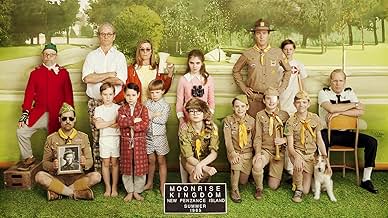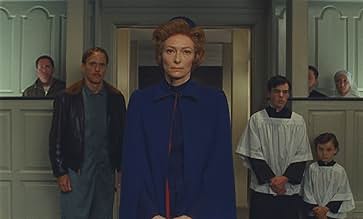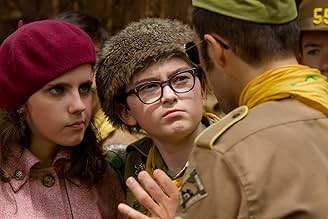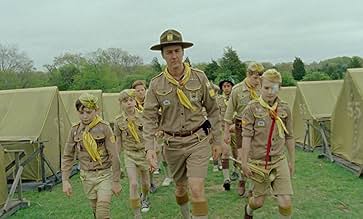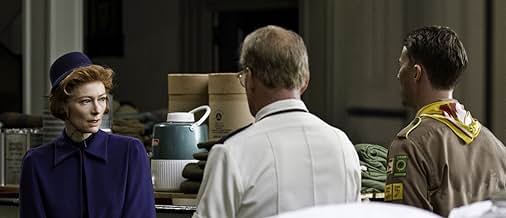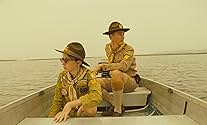Moonrise Kingdom
- 2012
- Tous publics
- 1h 34min
Une paire de jeunes amants s'enfuient de leur ville de New England, et le groupe de recherche des riverains s'étale à leur recherche.Une paire de jeunes amants s'enfuient de leur ville de New England, et le groupe de recherche des riverains s'étale à leur recherche.Une paire de jeunes amants s'enfuient de leur ville de New England, et le groupe de recherche des riverains s'étale à leur recherche.
- Réalisation
- Scénario
- Casting principal
- Nommé pour 1 Oscar
- 36 victoires et 121 nominations au total
Robert Hadlock
- Deluca
- (as Rob Campbell)
Avis à la une
Let's try to understand the miracle I have just witnessed. Director Wes Anderson is 12 years old, has just experienced his first love while at Summer camp, and immediately rushed to a camera to tell us, his pen pals, the story. A slightly embellished story which follows the perfect scenarios we would draw at night in our beds at this age. It has all the tiny details, the sense of adventure and the freshness of youth. How someone 43 years old in real life could do this movie is beyond me. The drawback of this miracle for the viewer is that such a jump back into the kind of idealized feelings you had in your early teens leaves you with quite some melancholy when you leave the cinema.
It could be that some people do not connect to the movie and just see it as "adorable" or "cute" and nothing more. But I suppose most people will feel connected, notably because the movie has this straight-to-the-point attitude in both the technique and the story-telling; the story is read to you, not force-fed with dramatic music and whatnot. Just like one of the characters who reads bedtime stories to the others.
You might complain about the lack of character development for some of the big names in this film (Norton, Willis, Murray - McDormand less so as she gets more detailed screen time than the others) but I suppose this is wanted: kids will see hints of the issues adults are facing, but can't understand them fully. And remember this is a movie shot by 12-year old Wes Anderson.
It could be that some people do not connect to the movie and just see it as "adorable" or "cute" and nothing more. But I suppose most people will feel connected, notably because the movie has this straight-to-the-point attitude in both the technique and the story-telling; the story is read to you, not force-fed with dramatic music and whatnot. Just like one of the characters who reads bedtime stories to the others.
You might complain about the lack of character development for some of the big names in this film (Norton, Willis, Murray - McDormand less so as she gets more detailed screen time than the others) but I suppose this is wanted: kids will see hints of the issues adults are facing, but can't understand them fully. And remember this is a movie shot by 12-year old Wes Anderson.
The thing that I enjoy most about Wes Anderson films is that they each feel like a great adventure and in this sense I think Moonrise Kingdom is his best yet. It tells that tale of Sam, an orphan on scout camp, and Suzy, a misunderstood girl, as they run away together. At first I found the two actors playing the kids to be kind of limp but after a few minutes I warmed to them and I actually think they were both pretty good overall, particularly Jared Gilman who plays Sam and even more so knowing that it's the first acting he's ever done. The rest of the cast are all pursuing or helping them in some way and there a couple of sub-plots with the island's policeman (played by Bruce Willis) and the parents of Suzy (Bill Murray and Frances McDormand).
I thought that the rest of the cast was great. In fairness I am a bit biased because I love Bill Murray, Edward Norton, Bruce Willis and Frances McDormand but even so I have to say that they were all really good, especially Edward Norton who plays the scout master, and Bill Murray. There are also a couple of minor roles for Jason Schwartzman, Harvey Keital and Tilda Swinton who were also a lot of fun. Everyone in the cast fits into their role really well which is obviously exactly what you want, but not only is that the case for the main roles but also for the less important ones, like the scout troupe (especially Sam's 'enemy'), Suzy's three brothers or the oddball narrator.
Cinematography wise I didn't think this movie was particularly spectacular, especially in comparison to other Wes Anderson movies like 'The Life Aquatic' or 'The Royal Tenenbaums'. There were a couple of shots that were cool though, some really long zoom outs (which sounds clichéd but it worked) and the doll house type ones that I love and think are awesome.
I wouldn't expect to wet your pants laughing at any moment in 'Moonrise Kingdom' but it is funny. There are a couple of laugh out loud moments and as a whole the jokes are pretty sharp and intelligently done. The reason I like the humour in this movie is that it's a part of the ambiance and feel of it, it won't make you crack up but it will make you have a smile on your face for pretty much the whole thing and leave you feeling strangely happy.
That kind of ambiance is really why the movie is so good, and is possibly Wes Anderson's best movie. The whole story is this fantastic blend of reality and child-like dreaming and it's wonderful. At times I felt kind of nostalgic and sad that I'm not a kid anymore. On the other hand it feels like a tribute to those myths and dreams of being a child and it works so well. This is the kind of film that I feel I could watch over and over again, each time spotting something new but also feeling good and enjoying the overall purpose.
Definitely go and see it!
I thought that the rest of the cast was great. In fairness I am a bit biased because I love Bill Murray, Edward Norton, Bruce Willis and Frances McDormand but even so I have to say that they were all really good, especially Edward Norton who plays the scout master, and Bill Murray. There are also a couple of minor roles for Jason Schwartzman, Harvey Keital and Tilda Swinton who were also a lot of fun. Everyone in the cast fits into their role really well which is obviously exactly what you want, but not only is that the case for the main roles but also for the less important ones, like the scout troupe (especially Sam's 'enemy'), Suzy's three brothers or the oddball narrator.
Cinematography wise I didn't think this movie was particularly spectacular, especially in comparison to other Wes Anderson movies like 'The Life Aquatic' or 'The Royal Tenenbaums'. There were a couple of shots that were cool though, some really long zoom outs (which sounds clichéd but it worked) and the doll house type ones that I love and think are awesome.
I wouldn't expect to wet your pants laughing at any moment in 'Moonrise Kingdom' but it is funny. There are a couple of laugh out loud moments and as a whole the jokes are pretty sharp and intelligently done. The reason I like the humour in this movie is that it's a part of the ambiance and feel of it, it won't make you crack up but it will make you have a smile on your face for pretty much the whole thing and leave you feeling strangely happy.
That kind of ambiance is really why the movie is so good, and is possibly Wes Anderson's best movie. The whole story is this fantastic blend of reality and child-like dreaming and it's wonderful. At times I felt kind of nostalgic and sad that I'm not a kid anymore. On the other hand it feels like a tribute to those myths and dreams of being a child and it works so well. This is the kind of film that I feel I could watch over and over again, each time spotting something new but also feeling good and enjoying the overall purpose.
Definitely go and see it!
It's 1965 and pre teen pen pals, Sam (Jared Gilman) and Suzy (Kara Heywood) agree to run away from home and meet up a year after meeting for the first time. While the two of them head off into the wilderness of Suzy's twelve mile long home island a search party that includes Island Policeman Bruce Willis, Scout leader Edward Norton, Suzy's parents Bill Murray and Frances McDormand and Sam's fellow Scouts set about trying to hunt the eloping children down in the days preceding a huge storm. I should say from the outset that I am a huge Wes Anderson fan and have absolutely loved all of his films with the exception of Fantastic Mr Fox so I went in expecting great things. My expectations were matched and even perhaps exceeded. I loved this film. Anderson sets up Suzy's home life in a fantastic opening sequence which features some exquisite tracking shots through the family home. Before anything is said it is already obvious to the audience that Suzy is a loner who longs for something bigger, something more. Her parents do not get on and are never even seen in the same room, let alone talking to each other. She has three younger brothers who appear to get along very well. Her house is large and well furnished, indicating wealth if not happiness. All of this is established in one long sequence of beautiful camera movements which last no longer than a couple of minutes. Sam's life with his Scout troupe is shown in a similar manner although it soon becomes apparent that he has already escaped in search of his love, Suzy. One of the things I love about all of Anderson's films is that you could turn on the TV at pretty much any moment during any of his films and within a few moments be sure that you are watching a Wes Anderson film. His style is very distinctive and it's all over his latest work. The shots are framed to perfection and each camera movement feels measured but not forced. There is a vague pastel and brown tint to everything which matches the film's period setting. Everything from the sets to the characters also feels slightly off centre and as though they inhabit the same world as The Royal Tenenbaums and The Darjeeling Limited. Anderson not only creates his own world for each film but his films feel somehow connected and as though they too inhabit the same slightly odd world. The plot is absolutely delightful and sweet. It's such a touching and loving story which also feels like a love letter to the children's adventure books of which Suzy reads throughout the film. Though they read these books, the children long for an adventure of their own and have finally embarked on one. The characters are equally enchanting. Sam and Suzy are somehow both old beyond their years but also very much still children. They have obvious intelligence and wisdom but convey it through a child's eyes. They are on the cusp of adulthood but somewhere in between. The acting of Hayward and Gilman is superb and again both feel both older than they are but also very child like. They are great. The adult characters are also great without exception. Bruce Willis is a sad and lonely cop who patrols a quiet island and although he has his faults is very kind and caring. Edward Norton is an exemplary leader who also has a big heart while Bill Murray and Frances McDormand, both lawyers, talk to each other using mostly legal language and although are not really in love with each other, care a lot for their children and want the best for them. There are also small cameos from Jason Schwartzman, Harvey Keitel and Tilda Swinton, all three of which were welcome and provided something. The adult cast on the whole was fantastic. The score goes perfectly with the on screen action and features a mixture of militaristic marching music, classical and 60s pop. They somehow all work together and help to push the story on to it's frenetic final act. This is a film with a big heart, lovely story and plenty of laughs. Although I only just saw it I already can't wait to see it again. It's everything you'd expect from a Wes Anderson film but as well as being unusual, wacky and nice to look at also has a sweet story about adolescence, growing up and first love.
Greetings again from the darkness. Not many people think like Wes Anderson. That's probably a good thing in real life. It's definitely a good thing for movies. He is a creative and distinct filmmaker, though not one with mass appeal. My two personal favorites of his are The Royal Tenenbaums and Rushmore. His previous film, Fantastic Mr Fox, was a solid hit and critically lauded. Now he delivers one that will probably only click with his core fans. It's a thing of beauty ... if you keep in mind that beauty is in the eye of the beholder.
Set on the fictional New Penzance Island off the coast of New England in 1965, the movie opens with terrific visuals of the Bishop family's lighthouse/home. Our tour is conducted as if the home were a dollhouse, and our eyes struggle to keep up with the detailed decor. We are struck by the color palette of tans, greens and splashes of red. This will continue throughout the movie.
The story centers around two 12 year old misfits: Sam and Suzy. Sam is an orphan and outcast in his Khaki Scouts troop, and Suzy is misunderstood and ignored by her selfish parents, who communicate with a bullhorn and through legalese at bedtime (they are both lawyers). Sam and Suzy are attracted to each other's misery and decide to run away together. This ignites a flurry of activity on this quiet island and showcases two first time actors with remarkable screen presence: Jared Gilman (Sam) and Kara Hayward (Suzy).
The "grown-ups" on the island include Suzy's parents played by Bill Murray (a Wes Anderson staple) and Frances McDormand. The island police chief is played Bruce Willis, who we soon figure out is also a social outcast. The Scoutmaster is played by Edward Norton in a regimented weirdness that will have you laughing in confoundment. For such serious topics, Mr. Anderson and co-writer Roman Coppola provide us many comedic moments - both through dialogue and site gags.
During the search, other colorful supporting characters get involved. Social Services is after Sam. Tilda Swinton plays Social Services. In one of the few gags, I'll give away, Swinton's character only introduces herself as Social Services. This is a gut punch to a system that is often under-staffed and forgetful of it's true mission. We also get Jason Schwartzman as a very helpful, though slightly seedy, Cousin Ben. Harvey Keitel plays the senior Scoutmaster who is unhappy with Norton for losing a scout. Bob Balaban makes periodic appearances as a narrator ... either for a documentary or for the movie, depending on the moment's need.
The script does a wonderful job of capturing how the 12 year old brain works. Some of the scenes with Sam and Suzy are almost like looking a photo album ... exactly the way our childhood memory works. Flashes of moments. The Alexandre Desplat score is heavy on percussion, but it works well with the minimalistic look of the film. It's also interesting to note that this is one of the few movies where it makes sense to have a soundtrack with Benjamin Britten, Hank Williams and Mozart! If you go to this one, keep your eyes open and moving, and your ears receptive. The payoff is worth it.
Set on the fictional New Penzance Island off the coast of New England in 1965, the movie opens with terrific visuals of the Bishop family's lighthouse/home. Our tour is conducted as if the home were a dollhouse, and our eyes struggle to keep up with the detailed decor. We are struck by the color palette of tans, greens and splashes of red. This will continue throughout the movie.
The story centers around two 12 year old misfits: Sam and Suzy. Sam is an orphan and outcast in his Khaki Scouts troop, and Suzy is misunderstood and ignored by her selfish parents, who communicate with a bullhorn and through legalese at bedtime (they are both lawyers). Sam and Suzy are attracted to each other's misery and decide to run away together. This ignites a flurry of activity on this quiet island and showcases two first time actors with remarkable screen presence: Jared Gilman (Sam) and Kara Hayward (Suzy).
The "grown-ups" on the island include Suzy's parents played by Bill Murray (a Wes Anderson staple) and Frances McDormand. The island police chief is played Bruce Willis, who we soon figure out is also a social outcast. The Scoutmaster is played by Edward Norton in a regimented weirdness that will have you laughing in confoundment. For such serious topics, Mr. Anderson and co-writer Roman Coppola provide us many comedic moments - both through dialogue and site gags.
During the search, other colorful supporting characters get involved. Social Services is after Sam. Tilda Swinton plays Social Services. In one of the few gags, I'll give away, Swinton's character only introduces herself as Social Services. This is a gut punch to a system that is often under-staffed and forgetful of it's true mission. We also get Jason Schwartzman as a very helpful, though slightly seedy, Cousin Ben. Harvey Keitel plays the senior Scoutmaster who is unhappy with Norton for losing a scout. Bob Balaban makes periodic appearances as a narrator ... either for a documentary or for the movie, depending on the moment's need.
The script does a wonderful job of capturing how the 12 year old brain works. Some of the scenes with Sam and Suzy are almost like looking a photo album ... exactly the way our childhood memory works. Flashes of moments. The Alexandre Desplat score is heavy on percussion, but it works well with the minimalistic look of the film. It's also interesting to note that this is one of the few movies where it makes sense to have a soundtrack with Benjamin Britten, Hank Williams and Mozart! If you go to this one, keep your eyes open and moving, and your ears receptive. The payoff is worth it.
The year is 1965 and a remote North Eastern coastal community is plunged into confusion when it discovers that two kids have run away. Sam, a discontented Khaki Scout, and Suzy, a put-upon older sister and forgotten daughter, abscond into the forest to escape their dissatisfying existences. The responsible adults – Sam's Scout Master Ward (Edward Norton) and Suzy's parents (Bill Murray and Frances McDormand) – and the entire town set out on a frenzied search, which gets wild when the largest storm in recorded history touches down and puts everyone's life into question. What ensues is a battle between youth and age, hope and disillusionment, faith and cynicism.
In terms of story and character, Wes Anderson's previous films, especially The Royal Tenenbaums and The Darjeeling Limited, are superior. Even in the most compelling relationship in the film between Captain Sharp (Bruce Willis) and Sam doesn't embody Anderson's ability to take his characters into deep emotional places of hurt and healing without melodrama. However, the newest addition to the Anderson canon is a cinematic experience.
Moonrise Kingdom's story, co-written with Roman Coppola, takes a definite backseat to style, as Anderson saturates the entire film with a "Norman Rockwell-type of Americana". Stylistically, it may be Anderson's most masterful work, as the costumes, sets, and settings transport the viewer to an alternate universe, a place of wonder and adventure. The soundtrack is especially effective, as it recalls a time when things were simpler: Hank Williams was on the radio, and children listened to records instead of playing video games. However, Anderson isn't content with reminiscing about the year 1965. He takes this nostalgia and twists it, infusing the film with a twinge of sadness through the reality of life's disappointments. He doesn't reject the Rockwellian view of America, but argues that it doesn't tell the whole story.
Moonrise Kingdom is that place of beauty and passion that we all have been in at least once in our lives – the one place on earth where we believe that anything is possible. It has since been lost, but it persists in our memories in moments of nostalgia.
In terms of story and character, Wes Anderson's previous films, especially The Royal Tenenbaums and The Darjeeling Limited, are superior. Even in the most compelling relationship in the film between Captain Sharp (Bruce Willis) and Sam doesn't embody Anderson's ability to take his characters into deep emotional places of hurt and healing without melodrama. However, the newest addition to the Anderson canon is a cinematic experience.
Moonrise Kingdom's story, co-written with Roman Coppola, takes a definite backseat to style, as Anderson saturates the entire film with a "Norman Rockwell-type of Americana". Stylistically, it may be Anderson's most masterful work, as the costumes, sets, and settings transport the viewer to an alternate universe, a place of wonder and adventure. The soundtrack is especially effective, as it recalls a time when things were simpler: Hank Williams was on the radio, and children listened to records instead of playing video games. However, Anderson isn't content with reminiscing about the year 1965. He takes this nostalgia and twists it, infusing the film with a twinge of sadness through the reality of life's disappointments. He doesn't reject the Rockwellian view of America, but argues that it doesn't tell the whole story.
Moonrise Kingdom is that place of beauty and passion that we all have been in at least once in our lives – the one place on earth where we believe that anything is possible. It has since been lost, but it persists in our memories in moments of nostalgia.
Wes Anderson Films as Ranked by IMDb Rating
Le saviez-vous
- AnecdotesThe dance scene on the beach was saved for the very end of filming, so that the two young leads would be comfortable around each other, and was done on a closed set (just the two leads, co-writer and director Wes Anderson, and the cameraman).
- GaffesThe pilot of the plane incorrectly says the word "five" as "fiver". In standard aviation phonetics--NATO alphabets--the number "nine" is pronounced "niner", to distinguish it from "five", which is pronounced as "fife".
- Crédits fousDuring the final credits, Alexandre Desplat's music is vocally decomposed, like it was for the piece of classical music during the movie.
- ConnexionsFeatured in At the Movies: Cannes Film Festival 2012 (2012)
- Bandes originalesThe Young Person's Guide to the Orchestra, Op. 34: Themes A.-F.
(1946)
Composed by Benjamin Britten
Performed by New York Philharmonic
Conducted by Leonard Bernstein
Narrated by Henry Chapin (uncredited)
Meilleurs choix
Connectez-vous pour évaluer et suivre la liste de favoris afin de recevoir des recommandations personnalisées
24 Frames From Wes Anderson Films
24 Frames From Wes Anderson Films
Explore the memorable career of Wes Anderson through 24 stills from his movies.
Détails
- Date de sortie
- Pays d’origine
- Sites officiels
- Langue
- Aussi connu sous le nom de
- Moonrise Kingdom. Un reino bajo la luna
- Lieux de tournage
- Fort Wetherill State Park, Jamestown, Rhode Island, États-Unis(moonrise kingdom cove)
- Sociétés de production
- Voir plus de crédits d'entreprise sur IMDbPro
Box-office
- Budget
- 16 000 000 $US (estimé)
- Montant brut aux États-Unis et au Canada
- 45 512 466 $US
- Week-end de sortie aux États-Unis et au Canada
- 522 996 $US
- 27 mai 2012
- Montant brut mondial
- 68 298 842 $US
- Durée1 heure 34 minutes
- Couleur
- Mixage
- Rapport de forme
- 1.85 : 1
Contribuer à cette page
Suggérer une modification ou ajouter du contenu manquant







